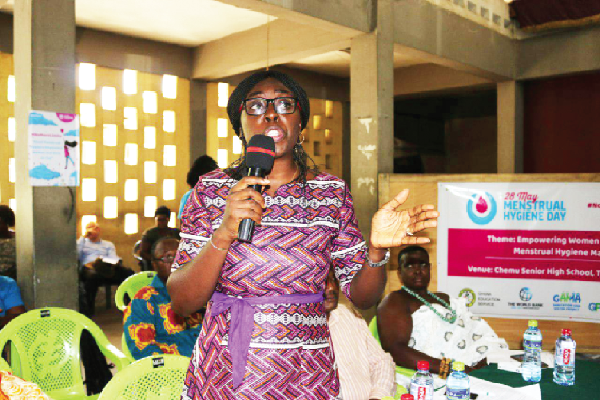
Lack of toilets in schools hindering girls education
It is estimated that almost 50 percent of basic schools in the country do not have access to toilets and Water, Sanitation and Hygiene (WASH) facilities.
This situation it is said makes it difficult for girls in their menstrual period to stay in school during that time of the month.
Advertisement
As part of activities marking this year’s Menstrual Hygiene Day, an awareness programme was held in Tema aimed at educating girls, boys and stakeholders on the benefits of menstrual hygiene for girls.
It was held on the theme: “No more limits, empowering women and girls through menstrual hygiene management.” More than 1,000 students of basic and second-cycle schools in the Tema metropolis attended the programme.
The event was organised by the Ghana Education Service, the World Bank, GAMA Sanitation and Water Project, the Global Partnership for Output-Based Aid (GPOBA), the United States Agency for International Development (USAID) and Unilever Ghana Foundation.
In an interview with journalists, the Deputy Director in charge of Environmental Health and Management at the Ministry of Sanitation and Water Resources, Mr Kweku Quansah, said the celebration of the day would help break the silence and build awareness of menstruation to enable women and girls to reach their full potential.
Access to WASH facilities
According to Mr Quansah, statistics from the Education Management Information System (EMIS) said close to 50 per cent of all basic schools in the country did not have access to toilets and Water, Sanitation and Hygiene (WASH) facilities and that ought to be addressed.
He stressed that the lack of access to WASH facilities and regular water supply sources had made it difficult for students to use school latrines and promote positive hygienic practices and habits.
He called on metropolitan, municipal and district assemblies (MMDAs) to prioritise the provision of these facilities to enable the children to learn in a clean, safe and healthy learning environment.
“If a girl stays in school for one year, she is able to reduce the infant mortality rate by close to five to 10 per cent. There is a direct impact on attracting girls to stay in school and also providing them with WASH facilities so that when they are in their menses, they do not stay out of school,” Mr Quansah stated.
He said in many rural settings, many girls dropped out of school due to the lack of WASH facilities, urging assemblies to take up the challenge and provide such facilities.
Education
The acting Tema Central Sub-Metro Director of Health Services, Dr Akosua Osei Manu, advised the girls to wash their hands with soap under running water before putting on their sanitary pads and ensure proper use of the sanitary pads to prevent leakages.
She also stressed the need for all stakeholders to provide support to girls to enable them to manage their menstrual periods by observing good menstrual hygiene practices.
Local materials
Two traditional rulers, the Divisional Chief of Gomoa Akyempim Traditional Area, Nana Ogyedom Ama Tsetsewa, and the Queenmother of the Twifo Hemaa Traditional Area, Nana Adjoa Timaa, bemoaned the lack of information and sanitary products in some parts of the country and stressed on the use of clean, cost-saving menstrual management materials by adolescent girls to deal with menstrual hygiene.



